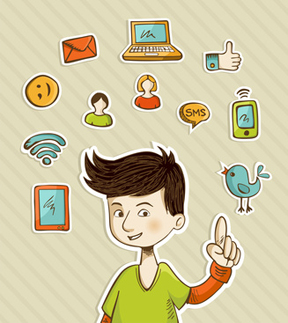Social media is harming the mental health of teenagers

The digital landscape has put increased pressure on teenagers today, and we feel it. There are so many social media channels: Facebook, Twitter, Instagram, Snapchat, Tumblr, you name it. I made a conscious decision to avoid Snapchat and Instagram because of the social pressure I saw them putting on my 14-year-old little sister. If my mum turned off the WiFi at 11pm, my sister would beg me to turn my phone into a hotspot. She always needed to load her Snapchat stories one more time, or to reply to a message that had come in two minutes ago because she didn’t want her friend to feel ignored. If I refused, saying she could respond in the morning, I’d get the “You’re ruining my social life” speech. Even as a teenager as well, I sometimes find this craze a little baffling.
A new study has found that teenagers who engage with social media during the night could be damaging their sleep and increasing their risk of anxiety and depression. Teenagers spoke about the pressure they felt to make themselves available 24/7, and the resulting anxiety if they did not respond immediately to texts or posts. Teens are so emotionally invested in social media that a fifth of secondary school pupils will wake up at night and log on, just to make sure they don’t miss out.
Perhaps the worst thing about this is that teenagers need more sleep than adults do, so night-time social media use could be detrimental to their health. Research has shown that teenagers need 9.5 hours of sleep each night but on average only get 7.5 hours. A lack of sleep can make teenagers tired, irritable, depressed and more likely to catch colds, flu and gastroenteritis. These days, I am always tired at school, and I’m not one to stay up until 2am chatting with a boy. Homework and the pressure to have the perfect set of grades mean I’m up late working. And it seems that at school, most of my mates are exhausted too.
During the summer holidays, I lost my phone. And for the week that I was phoneless, it felt like a disaster. I love my phone. It gives me quick access to information and allows me to be constantly looped in with my friends, to know exactly what is going on in their lives. So when I didn’t have my phone for a week, I felt a slight sense of Fomo, or if you’re not up to speed with the lingo, fear of missing out. By the end of the week, I’d got used to not having a phone and I’d quite enjoyed the break from social media. But there was still a lingering sense of sadness at the back of my mind that there would be conversations I had missed, messages that had been sent, funny videos shared and night-time chats that I would probably never get to see.
A separate study by the National Citizen Service found that, rather than talking to their parents, girls seek comfort on social media when they are worried. The survey also suggests that girls are likely to experience stress more often than boys – an average of twice a week.
It’s becoming more and more obvious how the pressures of social media disproportionately affect teenage girls. I can see it all around me. Pressure to be perfect. To look perfect, act perfect, have the perfect body, have the perfect group of friends, the perfect amount of likes on Instagram. Perfect, perfect, perfect. And if you don’t meet these ridiculously high standards, then the self-loathing and bullying begins.
What is really worrying is that time and time again, these studies pop up and demonstrate that the mental health of teenagers, especially teenage girls, is on the line. We know this. We know the perils of the internet, we’ve heard about online bullying and the dangers of Ask.fm, we know the slut-shaming that goes on in our schools. We know these things. We know that these studies demonstrate that we have to make personal, social and health education (PSHE) statutory in schools and ensure it covers a range of issues from healthy eating and sleeping to consent. And yet, Nicky Morgan and the government refuse to act. So I ask: what are we waiting for? Inaction on these issues is harming the physical and emotional wellbeing of young people in this country. What has to happen before we do something?
Article Source: http://www.theguardian.com/commentisfree/2015/sep/16/social-media-mental-health-teenagers-government-pshe-lessons
Image Source: http://penheel.com/wp-content/uploads/2012/07/SocialTeen.jpg
VOCABULARY WORDS:
1. Craze (n.) ~ an enthusiasm for a particular activity or object that typically appears suddenly and achieves widespread but short-lived popularity
2. Baffling (adj.) ~ impossible to understand perplexing
3. Detrimental (adj.) ~ tending to cause harm
4. Lingering (adj.) ~ lasting for a long time or slow to end
5. Disproportionately (adv.) ~ unequally
6. Self-loathing (n.) ~ refers to an extreme dislike or hatred of oneself, or being angry at or even prejudiced against oneself
QUESTIONS FOR DISCUSSION:
1. What kind of social media is popular in your country for teenagers?
2. According to the article, how do social media affect the confidence of teenagers?
3. What kind of health problems can social media cause?
4. According to one study, teenagers usually spend about nine hours each day using different kinds of social media, which is longer than the amount they spend on sleeping. What do you think are the implications of this trend?